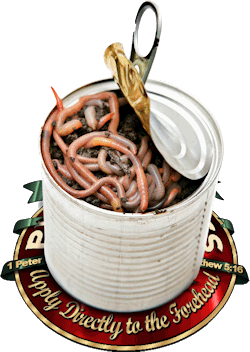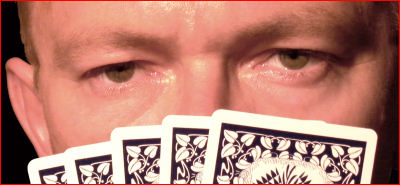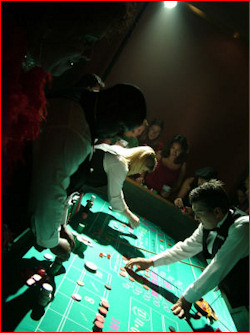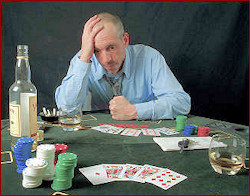Like many of you, I am absolutely slack-jawedly baffled at some of the names on "The Manhattan Declaration." I have already briefly expressed my own thoughts on that document.
Were I able to get their ear and interview them, these are the questions I would ask of the genuinely evangelical brothers and sisters who signed that thing:
- Is the Bible your sole, sufficient, ultimate source and authority for faith and practice?
- Do you believe that the Biblical Gospel is the good news that lost, sinful man can be reconciled to God by grace alone, through faith alone, in and because of Christ's person and work alone, to the glory of God alone, as seen with final authority in Scripture alone?
- Do you see — note well my wording — Scriptural warrant for applying the word "Christian" to anyone other than one who is yoked as a student to the words of Christ and His apostles (Acts 11:26), who affirms the Gospel as described in #2 above (Acts 26:28), and who has been spiritually regenerated by grace alone through faith alone (1 Peter 4:16; cf. 1:3-5)?
- Do you see — again, note well my wording — Scriptural warrant for applying the word "Christian" to anyone who would distort and oppose that Gospel, either personally or by aligning himself directly as a supporter (let alone promoter) of such institutional distortion and opposition?
- Do you believe that "distortion" of that Gospel is a damning heresy, such as falls under the thundering apostolic condemnation of Galatians 1:6-9?
- Do you believe that Roman Catholicism's official formulation of the gospel is such a damning heresy?
- Can a church be a Christian church if it has the Gospel wrong?
- What do you believe the Reformation was about?
- Do you believe the Reformation was vital and necessary, or a mistake?
- Do you agree with the document you signed, that the Popes of the 16th and 17th centuries were Christians (remembering ##1-6, above)?
- As to the central themes of the Reformation, has anything fundamental changed today, so that the Reformation is no longer relevant?
- Do you believe that persuading people to assent to a vaguely-Biblical opinion about homosexuality, marriage, or abortion is more critical than clearly presenting the Gospel, as described in #2 above?
- Do you admit that "The Manhattan Declaration" identifies as Christians men and women who are members of — indeed, leaders within — sects which (A) formally and officially oppose the Gospel as described in #2, above; and which (B) make a great deal of the fact that all adherents of those institutions must walk in lockstep conformity with their formal and official positions?
- If your son or daughter were to tell you that he or she wants to join the Orthodox or Roman Catholic church, "Because anyway, you said they were Christians just like you are, except for 'ecclesial
 difference'" — how would you respond?
difference'" — how would you respond?
- Can your fellow-signatories rely on the "Gospel" that their sects officially proclaim — which "Gospel" contradicts the Gospel as defined in #2 above — and still go to Heaven?
- Which is more important and more critical in our day: to define marriage, life, and civil liberty; or to define the Gospel?
- How can it be helpful to join hands in defining the former, with those who cannot define the latter?
- Can any civic gains that this document achieves for the issues of abortion or marriage offset the spiritual damage it causes in blurring the line between a true, Biblical, saving Gospel, and a false, un-Biblical, damning distortion?
- If you have answered all of the preceding questions, can you explain why you would not ask that your name be removed from "The Manhattan Declaration," which over and over again identifies both you and adherents of Gospel-distorting sects as alike Christians, which says that you and they alike "are compelled by our Christian faith," and which repeatedly suggest that you and they alike proclaim "the Gospel"?

What I would ask of those who have signed, I would press all the more urgently on anyone tempted to sign.
Now, nobody has to read all of those questions.
EXCEPT: if you want to comment on this post, you do. If you don't seem to have read them all, you will be asked to do so. And if you refuse, your comments will be deleted.
Therefore, if you comment, you will know that it is all about the Gospel.
That means that —
- We will not have any comments by anyone attempt to derail this into a discussion of homosexuality, abortion, or "co-belligerent" social involvement.
- We won't have anyone attempt to derail this into a discussion of the relative value of minimalist creeds.
- We won't have anyone attempt to derail this into a discussion of sociological definitions of "Christian."
- We won't have anyone attempt to derail this into a discussion of whether non-leaders who attend bad churches without accepting their damnable heresies can individually be saved.
- We won't have anyone attempt to derail this into a discussion of the spiritual condition of long-dead men or women.




 he brilliance of the gospel light is dimmed by error. The clearness of the testimony is spoiled when doubtful voices are scattered among the people, and those who ought to preach the truth, the whole truth, and nothing but the truth, are telling out for doctrines the imaginations of men, and the inventions of the age.
he brilliance of the gospel light is dimmed by error. The clearness of the testimony is spoiled when doubtful voices are scattered among the people, and those who ought to preach the truth, the whole truth, and nothing but the truth, are telling out for doctrines the imaginations of men, and the inventions of the age.
 o review one more time, these are the characteristics that define "gambling":
o review one more time, these are the characteristics that define "gambling":
 There's far more in that commandment than merely a prohibition against stealing. It also suggests that the proper way to earn wealth is by some form of work. It furthermore reminds us that a wonderful use of surplus wealth is charity towards the poor. Gambling subverts all those principles.
There's far more in that commandment than merely a prohibition against stealing. It also suggests that the proper way to earn wealth is by some form of work. It furthermore reminds us that a wonderful use of surplus wealth is charity towards the poor. Gambling subverts all those principles. Some readers asked me to address the question of whether raffles, door prizes, and carnival-style contests as fund-raising devices are morally equivalent to gambling. My short answer is that it depends on the circumstances. The definition of gambling I gave at the outset is my best answer to that. If the raffle prize is a donated item given to charity and not a "stake" paid for by entry fees, it wouldn't be gambling by most legal definitions.
Some readers asked me to address the question of whether raffles, door prizes, and carnival-style contests as fund-raising devices are morally equivalent to gambling. My short answer is that it depends on the circumstances. The definition of gambling I gave at the outset is my best answer to that. If the raffle prize is a donated item given to charity and not a "stake" paid for by entry fees, it wouldn't be gambling by most legal definitions.




 ere's a third characteristic of gambling. Remember, Gambling involves 1) Something valuable that is placed at risk; 2) Something belonging to someone else that is staked as a prize; and:
ere's a third characteristic of gambling. Remember, Gambling involves 1) Something valuable that is placed at risk; 2) Something belonging to someone else that is staked as a prize; and:




 e are looking at four essential characteristics in a standard definition of gambling. I have argued that each of the four characteristics involves a violation of one or more vital biblical principles.
e are looking at four essential characteristics in a standard definition of gambling. I have argued that each of the four characteristics involves a violation of one or more vital biblical principles. Gambling is stealing by mutual consent.
Gambling is stealing by mutual consent. 
 HE law of God is perfect. You cannot add anything to it, nor take anything from it, without spoiling it. If you will read the Ten Commands and understand them in their spiritual meaning, you will find that they are far-reaching, and that they deal with every sin.
HE law of God is perfect. You cannot add anything to it, nor take anything from it, without spoiling it. If you will read the Ten Commands and understand them in their spiritual meaning, you will find that they are far-reaching, and that they deal with every sin. closed
closed  One, something valuable is put at risk. Two, something belonging to someone else is at stake as a prize. Three, an element of chance is involved in determining the outcome. And four, no new wealth is created in the process.
One, something valuable is put at risk. Two, something belonging to someone else is at stake as a prize. Three, an element of chance is involved in determining the outcome. And four, no new wealth is created in the process. I know people—and in all likelihood you do, too—who claim that they gamble only for entertainment or recreation; not out of greed or covetousness.
I know people—and in all likelihood you do, too—who claim that they gamble only for entertainment or recreation; not out of greed or covetousness.



 he following is adapted from comments I originally posted in other forums, but since what I have to say below is germane to the large subject under discussion, I've distilled it here and am posting it so that it will be permanently attached to this thread. Like my remarks in the immediately preceding post, this one answers several e-mails that have been sent to me directly, and a few posts that have appeared other forums:
he following is adapted from comments I originally posted in other forums, but since what I have to say below is germane to the large subject under discussion, I've distilled it here and am posting it so that it will be permanently attached to this thread. Like my remarks in the immediately preceding post, this one answers several e-mails that have been sent to me directly, and a few posts that have appeared other forums: et me respond to some feedback that appeared in a different forum. I don't participate in the other forum, but the person who wrote this e-mailed it to me and invited me to respond. I'm posting my response here, because it might clear up some confusion other people have, too.
et me respond to some feedback that appeared in a different forum. I don't participate in the other forum, but the person who wrote this e-mailed it to me and invited me to respond. I'm posting my response here, because it might clear up some confusion other people have, too.


 In gambling, existing wealth merely changes hands. In other words, one person's gain always comes at the price of hurt caused to others. That is the reason an immoral principle underlies all gambling. (We'll probe this point more carefully before the end of this series.)
In gambling, existing wealth merely changes hands. In other words, one person's gain always comes at the price of hurt caused to others. That is the reason an immoral principle underlies all gambling. (We'll probe this point more carefully before the end of this series.)








